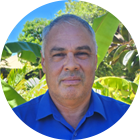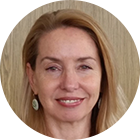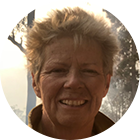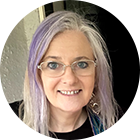Briony Rogers, Professor of Systems Change at the Monash Sustainable Development Institute, is a leader and expert at catalysing transformations to address the challenges of climate change. Through her work, she brings together people with diverse expertise and lived experience to develop hopeful visions and take action that has real-world impact for communities, cities and regions.
As CEO of Fire to Flourish, she leads a pioneering initiative to rethink our approach in the aftermath of disaster. Working closely in partnership with communities affected by the 2019/20 Summer bushfires, Fire to Flourish is piloting a model of holistic support for community-led recovery. As Director of MSDI Water, Briony leads a team of boundary spanners with expertise in water, governance, sustainability and system change with experience in developing and implementing collaborative processes and diagnostic tools to support change in policy and practice.
Before this, Briony was the Chief Research Officer for the Cooperative Research Centre for Water Sensitive Cities, where she led researchers from multiple universities to deliver an interdisciplinary research program spanning economics, governance, transitions, modelling, engineering and design. Briony has an interdisciplinary background, with a PhD in Environmental Sociology, a Bachelor of Civil Engineering (Honours) and Bachelor of Science.
Lindsey is an accomplished change leader with over a decade of expertise in strategic financial management, governance, and program oversight across both public and private sectors. She excels in driving impactful programs and fostering community-led recovery and resilience.
Currently, Lindsey is the Program Director at the Monash Sustainable Development Institute (MSDI) for the Fire to Flourish program. In this role, she oversees the design and management of a $70 million initiative, empowering bushfire affected communities in New South Wales and Victoria. The program’s innovative model profiles local leadership and action, working in partnership with government, philanthropic organizations, not-for-profits, and the private sector to strengthen holistic resilience and drive sustainable recovery.
Previously, as Program Manager for the City of Melbourne, Lindsey managed the implementation and governance of the $300 million combined Melbourne City Recovery and Revitalisation Funds. These initiatives were pivotal in reinvigorating the city post-COVID-19, driving economic recovery, and supporting local businesses through participatory approaches and community engagement. Lindsey's career is marked by a strong focus on responsive program delivery, innovative grant design and strategic financial management. She is passionate about values-driven outcomes, ensuring she delivers impactful and transformative programs that resonate deeply with communities.
Kizzy Nye is a proud Walbunja woman from Mogo on the NSW South Coast. Kizzy worked for the NSW Education Department as an Aboriginal Education Officer at Mogo Public School for 25 years and is dedicated to education and teaching the importance of practicing culture to our younger generation.
Kizzy has a lived experience of the catastrophic 2019-2020 Black Summer Bushfires, this experience enabled her to work tirelessly as a volunteer to assist her community in the recovery efforts in Mogo. Working alongside Elders and community members to deliver essentials and provide support where needed.
Kizzy is currently the Community Lead for Eurobodalla Fire to Flourish, helping to advance community-led disaster recovery and to address priorities and activities for recovery and resilience after the 2019-20 bushfires.
John Walters has been Chair of the not-for-profit Cobargo Community Development Corporation since it was forged out of the crucible of the disastrous 2019/20 Black Summer bushfires. John has also been a director since 2016 of the village’s largest business – the Cobargo Co-operative Society Limited - a multi-faceted member-owned enterprise providing a range of rural, hardware and nursery products to the community. John’s volunteering extends to his presidency of the local Rural Fire Brigade, as vice-chair of the Cobargo Quaama Business Recovery Group Inc, and as a committee member of the Cobargo RSL Sub-branch.
Awarded the 2024 Australia Day Cobargo Citizen of the Year, John is an active community volunteer who is employing his corporate experience drawn from a long and varied career spanning journalism, media and sales, and his personal advocacy skills and passion for community. John’s experience includes some 30 years in media, including with News Corp, and more recently 10 years in the renewable energy industry. John “retired” from the corporate world in 2014 and moved with his wife to a cottage in the heart of Cobargo to enjoy a more “relaxed” new life on the beautiful Sapphire Coast.
As chair of the Cobargo Community Development Corporation John has worked for the past four (4 ) years with a team of dedicated volunteer directors to successfully gain major Bush Fire recovery funding from NSW and Federal Government and deliver the REBUILD COBARGO project needed to restore the vital commercial heart of Cobargo tragically lost in the Black Summer bushfires, and to reinvigorate and secure the socio-economic survival of the village into the future. Under a unique model of community ownership and management, the project has drawn acclaim from NSW and Federal Government stakeholders as the “gold standard of community led disaster recovery”.
Sam leads the Northern Rivers Community Foundation (NRCF), an important source of funding and support for community organisations and networks across the region, particularly post-2022 floods. In this role, he is stewarding NRCF to work more systemically while continuing to support place-based grassroots groups to develop and deliver solutions appropriate for their community.
Sam’s experience encompasses corporate, not-for-profit, and governmental sectors, with extensive experience working with First Nations peoples on business/economic development projects in remote and regional areas. After completing an MBA (Social Impact) at UNSW, he transitioned into leadership roles within the not-for-profit sector. A long-term resident of Northern Rivers/Bundjalung, Sam spends his time with a mindfulness program of surfing and gardening, while raising a joyful/unruly pack of young kids, dogs, and chickens.












































































